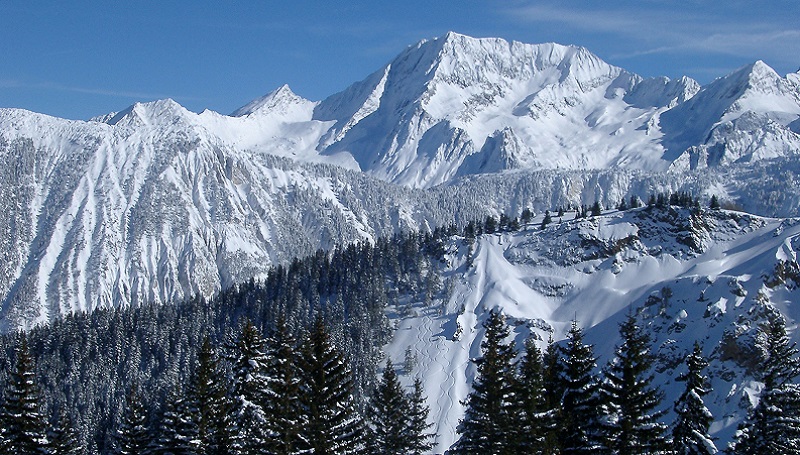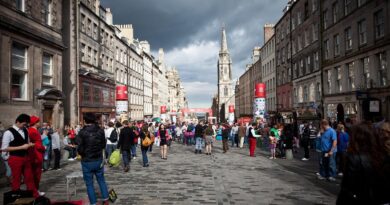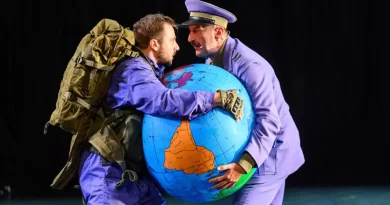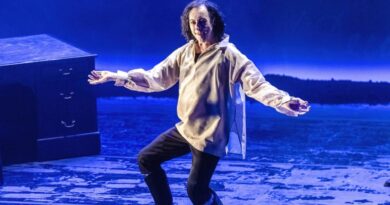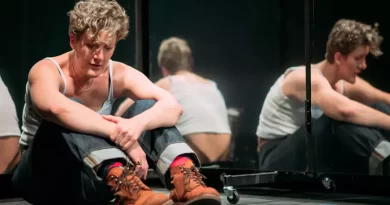The Mystery of the Dyatlov Pass
theSpace @ Symposium Hall – Annexe
15:00 – 50 minutes
To 26 August
**** Four-star show
Jeremy Malies in Edinburgh
15 August 2023
Acting Coach Scotland is a Glasgow-based academy whose full-time students have brought this show about the 1959 hiking disaster in the Soviet Union’s Ural Mountains to the Fringe.
I imagine that like me, most of the audience were expecting a drama documentary. What we got was a play (possibly devised among the group?) using the known facts as a springboard. It’s certainly not verbatim theatre but a piece that all the same showed respect for the undisputed information that we have. The authors do not advance any new madcap theory but stick with how people have speculated to date.
The fact that the age of the student hikers approximates to the actors’ own age makes the ending poignant. It’s not known what happened to the party; all died save one who had been suffering from sciatica and turned back. In their resolution, the actors use the five or so main theories that have been advanced to great effect.
There were several instances of gender-blind casting (with no attempt to be androgynous) which I found an obstacle at first, but the difficulties disappeared as the actors’ technical abilities surfaced.
Every time I questioned the content retrospectively, the plot as presented here proved to be grounded in fact. Why drink vodka in large amounts when you need clarity of thought in an environment where a single error can lead to your death? Well, autopsies revealed that several of the group had indeed been drinking.
Romantic overtures between the hikers was a step too far for me. I could have done with back projection showing images of the real hikers; there are many photographs and even some that emerged when film from cameras found on the corpses was processed. The lighting desk excels as it suggests flash bulbs popping for the group photos. The actor in the role of the hiker who turned back conveys survivor guilt and outrage at the accusations of possible treachery to great effect.
The hikers’ encounter with whatever killed them is about halfway through the 50 minutes. The company show the extent of their training as they present the agony of their bodies shutting down from the unnamed cause. Here on in, the actors are present-day youngsters and perhaps inhabited by the shades of the students who went before them. Their role now is to be commentators, interpreters, sleuths even.
The resolution? The group summarize the main competing theories for us. These include: a cloud of corrosive poison such as nitric acid; a violent encounter with indigenous reindeer herders; an avalanche; a Yeti-like creature; group hysteria; Soviet weapons test and interaction with UFOs.
The company serve up some of these scenarios and ask us to indicate our favoured explanation. “Soviet military activity” I shout. (Audience numbers are healthy but everybody else is more or less mute.) The company then act out a closing sequence based on this. Given that the last act is substantial they have obviously put much work into preparing all the options. A touching final song is given in Russian.
I just wondered if a huge overarching parallel might be being hinted at here: if Vladamir Putin is not deposed he continues to present chemical and conventional military threats to groups of young people who are at all radical in their thinking.
Acting Coach Scotland are certainly never prescriptive in telling us what to think which is a great plus point. There has been much research here but in no way does it get in the way of narrative flow. I could however have done with a few more laughs.
Being parochial about a truly international fringe festival would be dangerous, but theatre companies and educational institutions from Scotland deserve a spotlight when, as so often, they present high quality projects in the city. This is a bold and surprising choice of subject matter treated perceptively and with flair.

